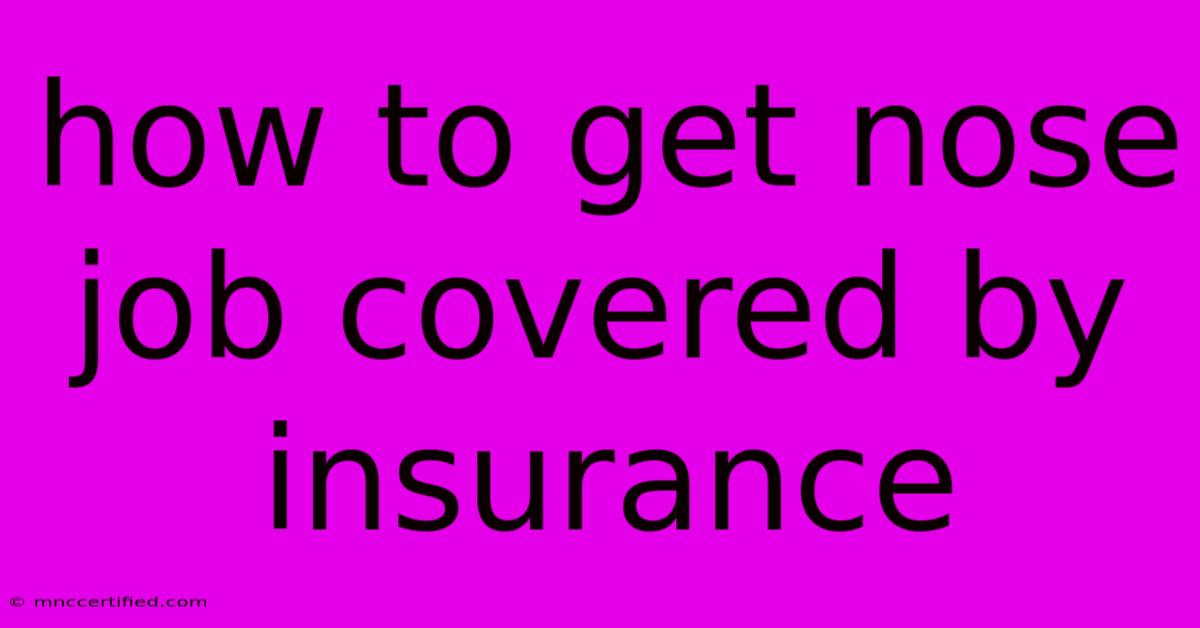How To Get Nose Job Covered By Insurance

Table of Contents
Can Insurance Cover a Nose Job? A Comprehensive Guide
A rhinoplasty, commonly known as a nose job, is a surgical procedure that can significantly alter your appearance and boost your confidence. But with the high costs associated with this procedure, many wonder: Can insurance cover a nose job?
The answer isn't straightforward, as insurance coverage for rhinoplasty varies widely depending on several factors. This comprehensive guide will explore the key aspects of insurance coverage for nose jobs, helping you understand when and how it might be possible.
When Insurance Might Cover a Nose Job
While most cosmetic procedures aren't covered by insurance, there are specific circumstances where a rhinoplasty can qualify for coverage. Insurance companies typically consider nose jobs medically necessary in the following cases:
- Breathing Problems: If your nose structure obstructs your airflow, causing difficulty breathing, snoring, or sleep apnea, insurance might cover the procedure to correct the underlying problem.
- Structural Deformities: Severe deformities caused by trauma, birth defects, or other medical conditions can also qualify for insurance coverage.
- Functional Issues: If a deviated septum or other structural issues affect your ability to smell, taste, or experience facial sensations, insurance may cover the corrective surgery.
Factors Influencing Coverage
Even when a nose job is medically necessary, several factors influence whether your insurance will cover it:
- Insurance Plan: Different insurance plans have varying coverage policies. Some may have limited coverage for rhinoplasty, while others may exclude it entirely.
- Pre-existing Conditions: Your medical history and pre-existing conditions can affect coverage. Some insurance companies may decline coverage if you have a history of cosmetic surgery.
- Physician's Documentation: Your physician's documentation plays a crucial role. They must clearly explain the medical necessity of the procedure, providing detailed evidence of breathing difficulties or functional impairments.
How to Increase Your Chances of Coverage
To increase your chances of getting your nose job covered by insurance, consider the following steps:
- Consult with your doctor: Discuss your concerns and potential health issues with your physician. They can assess your situation and determine if a rhinoplasty is medically necessary.
- Obtain detailed medical records: Gather all relevant medical records, including any previous medical diagnoses or treatment plans related to your nasal condition.
- Seek a second opinion: If your initial physician doesn't recommend a nose job or your insurance denies coverage, seek a second opinion from a qualified surgeon.
- Negotiate with your insurance company: If your insurance company denies coverage, consider appealing their decision. Provide them with a strong medical rationale for the procedure.
Alternatives to Insurance Coverage
If your insurance doesn't cover a nose job, there are alternative financing options available:
- Health Savings Account (HSA): If you have an HSA, you can use pre-tax dollars to pay for medical expenses, including a nose job.
- Flexible Spending Account (FSA): Similar to HSAs, FSAs allow you to use pre-tax dollars to pay for eligible medical expenses.
- Personal loans: Consider taking out a personal loan to cover the costs of the procedure.
- Payment plans: Many cosmetic surgeons offer payment plans to make the procedure more affordable.
Conclusion
While insurance coverage for nose jobs can be challenging, understanding the factors that influence it can significantly improve your chances of obtaining approval. Be prepared to provide strong medical documentation, discuss your options with your doctor, and explore alternative financing options if necessary. Remember, a well-planned approach can help you achieve your desired results while keeping financial considerations in mind.

Thank you for visiting our website wich cover about How To Get Nose Job Covered By Insurance. We hope the information provided has been useful to you. Feel free to contact us if you have any questions or need further assistance. See you next time and dont miss to bookmark.
Featured Posts
-
Man Utd Vs Paok Live Goal Updates
Nov 08, 2024
-
Outer Banks Season 4 Ending Explained Character Name Fate
Nov 08, 2024
-
Ashley Jensen On Shetlands Future After
Nov 08, 2024
-
Halle Bailey Overreacted To Sons Appearance
Nov 08, 2024
-
Germanys Government Collapse What Now
Nov 08, 2024